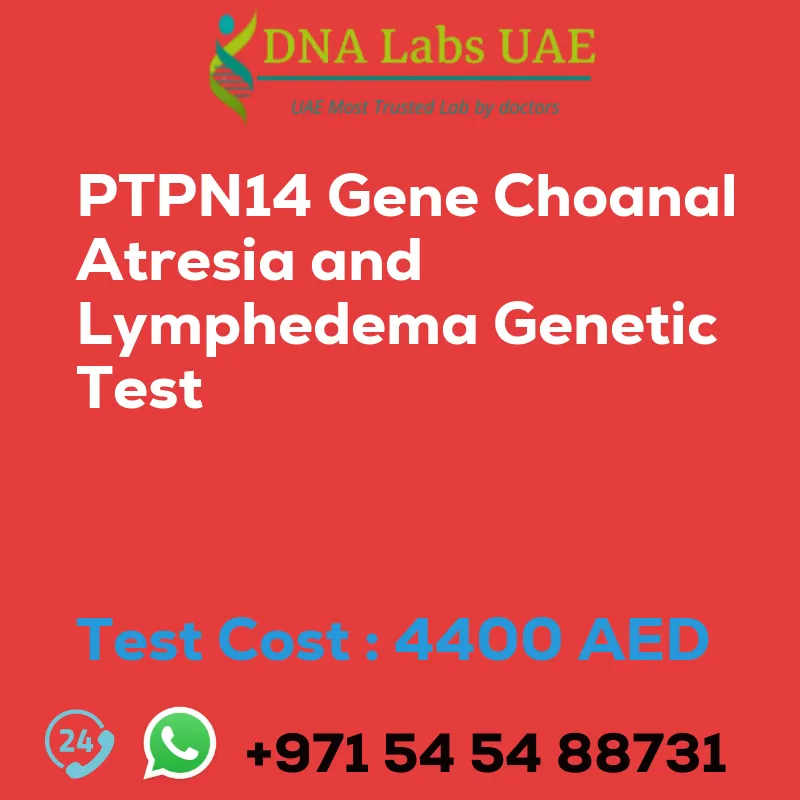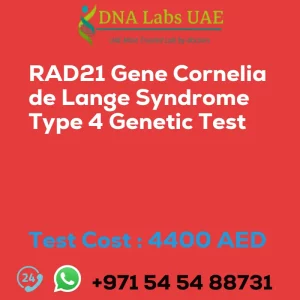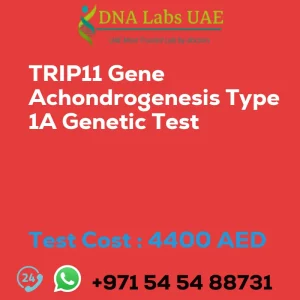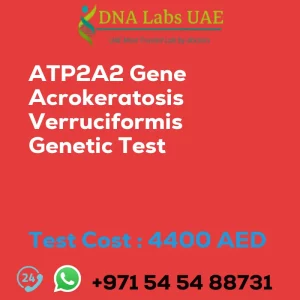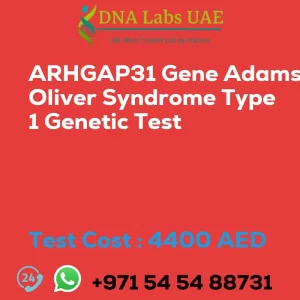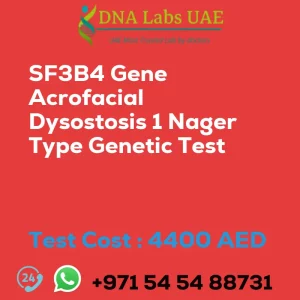PTPN14 Gene Choanal Atresia and Lymphedema Genetic Test
Test Name: PTPN14 Gene Choanal Atresia and Lymphedema Genetic Test
Components: Blood or Extracted DNA or One drop Blood on FTA Card
Price: 4400.0 AED
Report Delivery: 3 to 4 Weeks
Method: NGS Technology
Test Type: Osteology Dermatology Immunology Disorders
Doctor: Dermatologist
Test Department: Genetics
Pre Test Information
Clinical History of Patient who is going for PTPN14 Gene Choanal Atresia and Lymphedema NGS Genetic DNA Test. A Genetic Counselling session to draw a pedigree chart of family members affected with PTPN14 Gene Choanal Atresia and Lymphedema NGS Genetic DNA Test gene PTPN14.
Test Details
The PTPN14 gene is a gene that codes for a protein tyrosine phosphatase involved in cell signaling and regulation. Mutations in the PTPN14 gene have been associated with several genetic disorders, including choanal atresia and lymphedema.
Choanal atresia is a condition characterized by the blockage or narrowing of the nasal passages due to the abnormal development of the thin bony or membranous tissue that separates the nasal cavity from the back of the throat. This can lead to difficulty breathing through the nose, nasal congestion, and feeding difficulties in newborns. Choanal atresia can occur as an isolated abnormality or as part of a genetic syndrome.
Lymphedema is a condition characterized by the accumulation of lymphatic fluid, leading to swelling in various parts of the body. It can be primary (inherited) or secondary (due to damage or obstruction of the lymphatic system). Mutations in the PTPN14 gene have been associated with primary lymphedema, particularly in a condition known as lymphedema-distichiasis syndrome. This syndrome is characterized by the abnormal growth of eyelashes (distichiasis) along with lymphedema in the limbs.
NGS (Next-Generation Sequencing) genetic testing is a type of genetic testing that uses advanced sequencing technology to analyze multiple genes simultaneously. In the case of choanal atresia and lymphedema, NGS genetic testing can be used to identify mutations in the PTPN14 gene and other genes associated with these conditions. This can help in the diagnosis of these conditions, provide information about the inheritance pattern, and guide treatment and management options.
| Test Name | PTPN14 Gene Choanal atresia and lymphedema Genetic Test |
|---|---|
| Components | |
| Price | 4400.0 AED |
| Sample Condition | Blood or Extracted DNA or One drop Blood on FTA Card |
| Report Delivery | 3 to 4 Weeks |
| Method | NGS Technology |
| Test type | Osteology Dermatology Immunology Disorders |
| Doctor | Dermatologist |
| Test Department: | Genetics |
| Pre Test Information | Clinical History of Patient who is going for PTPN14 Gene Choanal atresia and lymphedema NGS Genetic DNA Test. A Genetic Counselling session to draw a pedigree chart of family members affected with PTPN14 Gene Choanal atresia and lymphedema NGS Genetic DNA Test gene PTPN14 |
| Test Details |
The PTPN14 gene is a gene that codes for a protein tyrosine phosphatase involved in cell signaling and regulation. Mutations in the PTPN14 gene have been associated with several genetic disorders, including choanal atresia and lymphedema. Choanal atresia is a condition characterized by the blockage or narrowing of the nasal passages due to the abnormal development of the thin bony or membranous tissue that separates the nasal cavity from the back of the throat. This can lead to difficulty breathing through the nose, nasal congestion, and feeding difficulties in newborns. Choanal atresia can occur as an isolated abnormality or as part of a genetic syndrome. Lymphedema is a condition characterized by the accumulation of lymphatic fluid, leading to swelling in various parts of the body. It can be primary (inherited) or secondary (due to damage or obstruction of the lymphatic system). Mutations in the PTPN14 gene have been associated with primary lymphedema, particularly in a condition known as lymphedema-distichiasis syndrome. This syndrome is characterized by the abnormal growth of eyelashes (distichiasis) along with lymphedema in the limbs. NGS (Next-Generation Sequencing) genetic testing is a type of genetic testing that uses advanced sequencing technology to analyze multiple genes simultaneously. In the case of choanal atresia and lymphedema, NGS genetic testing can be used to identify mutations in the PTPN14 gene and other genes associated with these conditions. This can help in the diagnosis of these conditions, provide information about the inheritance pattern, and guide treatment and management options. |

